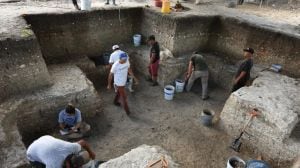No banners, no slogans: Nagas usher in new campaign mantra
This year, campaigning in this hill state is devoid of the regular slogan shouting, huge banners, blaring microphones and political rallies.

This year, campaigning in this hill state is devoid of the regular slogan shouting, huge banners, blaring microphones and political rallies. Thanks to youth groups, a new concept — Common Platform — has been introduced across Nagaland in order to bring the candidates and the voters closer.
Youth groups in every locality fix a date and time for a Common Platform and each candidate is given 20 to 30 minutes to deliver a speech, preferably a written one. The meeting begins with a prayer by the village pastor.
Last Friday, Rev Keviyiekielie Linyu, executive director of the Angami Baptist Church Council of Kohima village, read out a prayer from the Bible, prior to the start of the Common Platform. President of Kohima Village Youth Organisation, Meselhoulie Rame, who chaired the meeting, read out the rules: Each of the three candidates contesting for the Northern Angami-1 Assembly constituency would be given 20 minutes to tell people why they are contesting and what they would do on being elected. The candidates — Shurhozelie Liezietsu (NPF), Seyiekuolie Kesiezie (Congress) and Prasielie Pienyu (Independent) — went up on the stage, one after the other, to speak to the people. There was no slogan shouting, no display of party flags, no banners, no clapping and no candidate was booed. “It is a new concept of electioneering that makes the people active participants of the democratic process,” said Rame.
As the polling day draws closer, the Common Platform is spreading to every corner of the hill state, giving a new dimension to electioneering. “Earlier, campaigns used to be chaotic, and even violent. Now, the youth groups conducting such meetings have banned rallies. The electioneering is disciplined and peaceful,” said social worker Charles Chasie.
Candidates and parties too like the concept. “It not only saves time but also cuts down expenditure,” said Pienyu, the Independent candidate.
Nagaland, however, is not the first state to have Common Platforms. It was the Young Mizo Association in Mizoram that had started this concept in 1993.
Besides Common Platform, the Naga voters have interesting characteristics that differentiate them from voters elsewhere in the country. “They don’t clap or cheer and do not respond the way people in other states do when you raise a slogan,” said Margaret Alva, AICC general secretary in charge of Nagaland polls. “Unlike in Meghalaya where people come out in large numbers in their colourful tribal attires, the Nagas are not fond of public meetings and processions,” added Alva, who has been hopping from one constituency to another across Nagaland.
“They do not like listening to speeches by campaigners from outside,” said Ranji Thomas, AICC secretary, who has been here for over a month now. “As a result, candidates hardly ask for star campaigners from outside the state,” he said. Take the case of Prime Minister Manmohan Singh’s public meeting here last Wednesday. The attendance was barely 3,000, with party leaders struggling to get response from the crowd by shouting “Congress party zindabad” and “Manmohan Singh zindabad”.
Photos






- 01
- 02
- 03
- 04
- 05

























